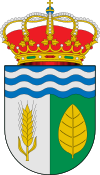Tiétar, Cáceres facts for kids
Quick facts for kids
Tiétar
|
|||
|---|---|---|---|
|
|||
| Country | Spain | ||
| Autonomous community | Extremadura | ||
| Province | Cáceres | ||
| Comarca | Campo Arañuelo | ||
| Area | |||
| • Total | 23,91 km2 (923 sq mi) | ||
| Elevation | 277 m (909 ft) | ||
| Population
(2018)
|
|||
| • Total | 921 | ||
| • Density | 0.38519/km2 (0.9976/sq mi) | ||
| Time zone | UTC+1 (CET) | ||
| • Summer (DST) | UTC+2 (CEST) | ||
Tiétar is a small town, also called a municipality, located in the province of Cáceres. This province is part of Extremadura, a region in Spain.
In 2013, a count of the people, known as a census, showed that Tiétar had about 948 residents. This count is done by the National Statistics Institute of Spain.
Tiétar used to be part of a nearby town called Talayuela. However, on July 1, 2011, Tiétar officially became its own separate municipality. This means it now has its own local government.
Contents
Discovering Tiétar: A Spanish Town
Tiétar is a unique place with its own history. It is nestled in the beautiful region of Extremadura. This area is known for its natural beauty and interesting towns.
Where is Tiétar Located?
Tiétar is found in the western part of Spain. It is in the province of Cáceres. This province is one of two provinces that make up the Extremadura region. The town is situated at an elevation of 277 meters (about 909 feet) above sea level.
How Many People Live in Tiétar?
The number of people living in Tiétar changes over time. In 2018, the population was recorded as 921 people. This shows a slight decrease from the 2013 census. Population counts help us understand how communities grow or change.
Tiétar's Independence: A New Beginning
For a long time, Tiétar was part of the larger municipality of Talayuela. But the people of Tiétar wanted to manage their own local affairs. They worked to become an independent town.
Becoming an Independent Municipality
On July 1, 2011, Tiétar officially separated from Talayuela. This was a big step for the community. Becoming an independent municipality means Tiétar can now make its own decisions about local services. These services include things like town planning, local taxes, and community events. This change allows the people of Tiétar to have more control over their future.
See also
 In Spanish: Tiétar (Cáceres) para niños
In Spanish: Tiétar (Cáceres) para niños



